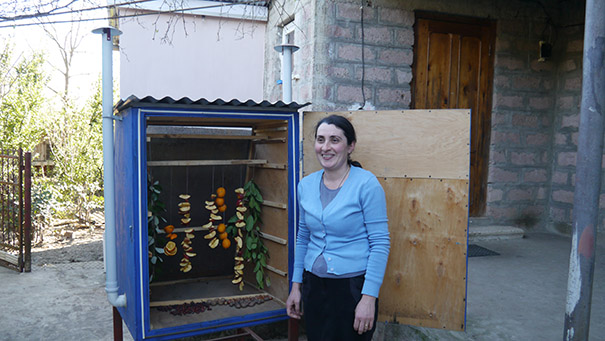In the nation of Georgia, the average rural family makes under 3,000 USD annually, and unemployment is 70 percent. Often, these rural communities don’t have public access to electricity. As families cut trees for wood to heat their houses, cook and meet other basic needs, deforestation and the corresponding environmental challenges have been on the rise.
On the other side of the world, in September the world adopted the Global Goals for Sustainable Development at the United Nations headquarters in New York City. These 17 individual goals together aim to end poverty, fight climate change and overcome inequality and injustice by 2030. This second objective, fighting climate change, is critical to the success of the goals as a whole. If we don’t take it seriously, we are never going to be able to reach any of these goals.
When I visited Georgia last month to meet families that are part of a CWS renewable energy program there, I was struck by how this program is addressing climate change while simultaneously helping families out of poverty.
This program works in Georgia, Moldova and Bosnia and Herzegovina to connect rural families who either have sky high electricity bills or no electricity at all to alternative energy sources. Among the technologies used are solar water heaters, solar house heaters and solar fruit dryers. In Georgia, CWS and partners have a training center near the capital of Tbilisi where community members learn how to build and use these technologies, which are primarily made of local materials. CWS then assists families to build their own locally.
Because we have helped these families, especially women, access renewable energy, they don’t have to spend as much money on energy bills and can use that money to meet other needs. In the case of solar fruit dryers, there is even opportunity for extra income.
Close to the town of Khobi near the Black Sea, I met Mzisadar Kiria. With support from CWS, she now has a solar fruit and vegetable dryer and can dry about 250 pounds of different fruits. This serves the dual purpose of ensuring that fruit doesn’t go to waste and providing Mzisadar and her family with extra income through the sale of the dried fruits. Her family made about $220 through fruit sales last year.
As I toured the training center in Tbilisi and met recipient families in the areas around Khobi, I was impressed with how every dollar from the program is used with care. Families are now generating energy in a self-sufficient and sustainable way, all while reducing food waste.
This efficient program is good for the families and good for the environment. It is combating climate change in a very real way while ensuring that more families are strong and independent. It is truly a win-win.
Maurice Bloem is the Executive Vice President at CWS. Follow him on Twitter: @mauricebloem. Special thanks to Laura Curkendall, CROP Communications Manager, for her role in producing this piece.

